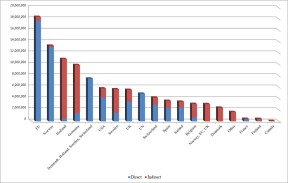NGO Transparency Law Update: NGO Funding From Foreign Governments Reported to the Israeli Registrar of Non-Profits, 2012-2014
See here for complete PDF version of this report.
See here for more on Israeli NGOs: Foreign Funding, Transparency, and Knesset Legislation.
(As of January 20, 2015)
Please note: All donors, names of NGOs, grants amounts, and projects are taken directly from the official website of the Israeli Registrar of Non-Profits (Rasham Ha-Amutot) (unless stated otherwise).
Overview
Israeli non-governmental organizations (NGOs) receive foreign government funding via two primary channels: direct funding from government-controlled bodies and indirect funding from government-funded third-parties (foundations and humanitarian, development, and religious NGOs) that channel funds to local NGOs.
The Israeli “Law on Disclosure Requirements For [Groups] Supported by a Foreign Governmental Body” (NGO Transparency Law – February 2011) provides an appropriate and timely framework to inform the Israeli public about foreign government involvement in Israeli political issues. As implemented by the Israeli Ministry of Justice, the law is an international model for transparency.
The law requires that a “recipient of support that received a donation from a Foreign Governmental Body will submit to the Registrar, within a week of the end of the quarter in which the donation was received, a report in an online form which the Minister of Justice will formulate.” Various NGOs have implemented these regulations, in full or in part, since the beginning of 2012. This has allowed the Israeli public to identify donors, funding amounts received, and the nature of the projects implemented by NGOs. However, as NGO Monitor analysis has shown in previous years (2012-2013), some NGOs fail to submit reports, as required by law. This indicates the necessity of stronger enforcement by the Ministry of Justice and the Registrar of Non-Profits (the Registrar).
In some instances, NGOs publish the required quarterly reports on their website, but the same updated information is not provided by the Registrar. For example, the Alternative Information Center’s (AIC) website presents the reports it submitted to the Registrar, but these do not appear in the Registrar’s system; Yesh Din’s website provides 3 quarterly reports for 2014, but only 2 are available on the government site.
Many political advocacy NGOs that regularly receive funding from foreign governments did not submit quarterly reports at all. It is unknown whether they did not receive foreign government funding during the reporting period, whether they have failed to act in accordance with the law, or whether they did not report due technical issues in the reporting system.
The following analysis presents the data from NGO quarterly reports, highlighting those involved in the Arab-Israeli conflict. The analysis includes a discussion on the effectiveness of the law, its limitations (especially regarding enforcement), and its role in promoting transparency and accountability as democratic values in Israel.
NGO selection criteria for analysis
The Registrar of Non-Profits website contains reports from 75 NGOs (non-profit associations and companies for the public benefit), dealing with a wide variety of issues and agendas, for a total sum of 176,147,446 NIS in the years 2012-2014 (see Appendix I).
These NGOs can be categorized according to the nature of their activities:
1. Political NGOs involved in polarizing activity and advocacy in the context of the Arab-Israeli conflict. These include groups that are directly or indirectly active in BDS (boycott, divestment, and sanctions) campaigns, lawfare, delegitimization, demonization, and lobbying against the state of Israel, including involvement in the Goldstone report, the UN fact-finding commission on the Gaza War (2014- “Schabas” commission), and campaigns concerning the International Criminal Court (ICC).
2. NGOs dealing with other dimensions of the Arab-Israeli conflict, the majority of their activities aimed at cooperation and co-existence.
3. Other Non-Profits working on various issues in Israeli society.
Data for 2012-2014 – Political organizations
As of January 20, 2015, 24 political advocacy NGOs had reported (partially or in full) donations received from foreign government entities for a sum total of 104,470,500 NIS in 2012-2014 (60% of total reported donations on the Registrar’s website).
- NGOs reported a total of 43,429,982 NIS in 2012, 40,859,199 NIS in 2013, and 20,191,319 in 2014.
- The political NGOs that reported as required by law are: Bimkom; B’Tselem; Gisha; the Association for Human Rights in Israel (ACRI); The Public Committee Against Torture (PCATI); Israel Social TV; Hamoked; Zochrot; H.L Education for Peace ltd. (the Geneva Initiative); Parents Circle; Terrestrial Jerusalem; Yesh Din; Ir Amim; Coalition of Women for Peace (CWP); Machsom Watch; Keshev; Rabbis for Human Rights; Physicians for Human Rights-Israel (PHR-I); Breaking the Silence; +972 Magazine; Mossawa; Adalah; AIC; Who Profits.
- The data reveal massive funding from the European Union (EU) (17,649,577 NIS) and Norway (13,332,079 NIS), which constitute 17.2% and 13% respectively of the total donations reported by political NGOs (see Appendix II).
- The Human Rights and International Humanitarian Law Secretariat (“the Secretariat” – formerly under the name of the NGO Development Center) is a unique funding mechanism. Located in Ramallah, the Secretariat is managed by Birzeit University and the European consulting firm NIRAS, to distribute pooled funding from Sweden, Denmark, Switzerland, and the Netherlands.
- The NGO submissions disclose funding to organizations that campaign against the right of the Jewish nation to sovereign equality. For instance Zochrot, an Israeli- NGO that advocates for the return of Palestinian refugees and the dismantling of Israel, received 2,374,139 NIS of indirect funding from Belgium, Ireland, Germany, and Finland in 2012-2014. “Who Profits,” a leader in BDS campaigns, registered as a non-profit association (“Amutah”) in 2013 after splitting from Coalition of Women for Peace (CWP); in 2014, it received indirect donations originating in the Netherlands, Germany, Norway, and Ireland totaling 841,040 NIS.
- Some donor bodies (most serving as conduits for government funding) such as Christian Aid, Diakonia, Oxfam-Novib, and the Norwegian Refugee Council, are themselves involved in anti-Israel campaigns.
- Some submissions to the Registrar contain what appear to be private donors that do not constitute a “governmental entity,” including church groups and unrecognizable names.
Transparency as opposed to NGO activity restrictions
- The Transparency Law was opposed by several groups that initiated an international campaign against the bill before it became law. These included the political groups listed above. Contrary to their claims, however, the law does not target any specific type of organization or seek to curtail its activities. Its sole purpose is to enhance transparency regarding the extent and objectives of foreign government funding for Israeli organizations.
- Examples of false claims in the context of this campaign:
- “This bill will restrict the activity of organizations that are active on a wide variety of issues in Israel and the territories, from environmental groups to peace and human rights groups.” (Bimkom, B’Tselem, Gisha, ACRI, PCATI, Hamoked, Yesh Din, Adalah, RHR, PHR-I, June 22, 2010)
- “We wish to warn against the advancement of this legislation that will harm the freedom of association and activities of civil society bodies in Israel, and sadly [due to the selectivity of this bill] it seems that it is directed solely against certain organizations.” (ACRI, August 15, 2010).
- “It [the law] is the single most dangerous threat to Israeli civil society since its inception.” (Naomi Chazan, New Israel Fund, May 10, 2010).
- Countering this campaign were Members of Knesset (MKs) and other organizations that wished to impose stricter legal approaches. Claiming that transparency alone was insufficient, these MKs attempted to add restrictive measures. Although these attempts stemmed from legitimate public concern regarding foreign funding for Israeli political organizations, specifically related to BDS and lawfare against Israeli soldiers and officials, the proposed restrictions were not effective and may have harmed Israel’s democratic process:
- Proposed bill:Amending the income tax ordnance (taxation of income of public institutions receiving foreign government funding), February 2011 – did not reach preliminary reading.
- Proposed bill: Non-profit Association Law (amendment – forbidding donations from foreign governmental bodies), June 2011 – did not reach preliminary reading.
- Proposed law:Amending the income tax ordinance (foreign state entity support for non-profit associations in Israel), July 2013 – approved by Ministerial legislation committee (December 2013); frozen after appeal by Ministers Livni, Perry, and Lapid.
Limitations of the Transparency Law
Twenty-four NGOs reported in part or in full to the Registrar between 2012 and 2014. In order to identify other political NGOs that did not fully report foreign funding to Registrar, the following analysis (Table B) shows the reporting status of 31 NGOs that have previously received foreign government funding, as reported by the NGO or the government entity.
- Due to the fact that the annual and quarterly reports are submitted independently of each other and are under different legal frameworks (the Law of Non-Profit Associations, and the Transparency Law, respectively), in many cases there is a discrepancy between the total sum of donations according to quarterly reports and the data presented in the annual financial report for the same year. This gap can result from a transfer of funds late in one year, approved for use and only reported in the annual report the following year.
- In quarterly reports, it is impossible to distinguish between annual, quarterly, or multiyear grants. Hence an exceptionally large grant during a certain quarter or year does not necessarily indicate an increase in donations or activities, but may reflect a portion of a multiyear donation designated for a longer period. Additionally, excluding Mossawa, no group reported if a grant was intended to be shared with other NGOs.
- Despite these limitations, the Registrar reports shed light on the various processes and mechanisms used by foreign governments to fund civil society in Israel. Without the law, this information would be impossible to glean due to a lack of transparency on the part of funders.
Recommendations
- Improving the Registrar’s reporting system. The current quarterly report system does not adequately address transparency needs as required by law. The system reveals gaps in the data, either due to late reporting by NGOs or slow updating of the Registrar’s website. As demonstrated by NGO Monitor’s database based on information from the Registrar website, the system should be improved to allow for simple data access, including the ability to filter the information according to donor, years, and objectives.
- Improving the regulations of the current law. A description of the type of donation – annual, quarterly, multiyear, or otherwise – should be mandated by law. This will enable public understanding of how the reported figures reconcile with the totals for that year. NGOs should also disclose how funding was received, such as cash receivable or restricted funds.
- Enforcement. The Registrar must improve its enforcement of reporting requirements, within a reasonable period of time. Some NGOs take advantage of lax enforcement and continue to receive funding despite their uncertain legal status.
- Additional transparency legislation. Based on the model of the current law, additional transparency laws should be considered, while avoiding restrictions on NGO activities.
Appendix 1
See here for table of all grants.


